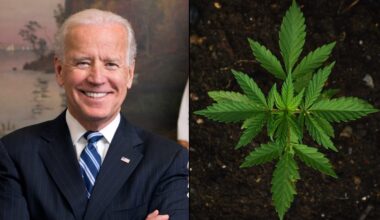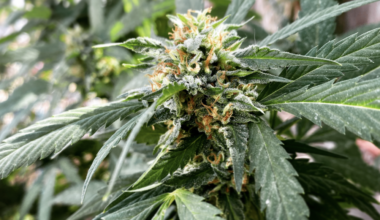A California bill to legalize psychedelics possession is not passing this year, despite the Senate sponsor’s last-minute efforts to reach a grand compromise that would allow it to be enacted this session.
An eleventh hour push to make key amendments—including the removal of “synthetic” psychedelics like LSD and MDMA from the proposed list of decriminalized substances in order to shift law enforcement organizations from being opposed to neutral on the bill—couldn’t carry the legislation across the finish line in a way that was satisfactory to its supporters and sponsor.
But Sen. Scott Wiener (D) told Marijuana Moment that the fight to stop criminalizing Californians over psychedelic substances isn’t over.
The Senate-passed bill, SB 519, went through the wringer before the sponsor finally decided to pull it on Friday. In the Assembly, it advanced through two committees, with amendments negotiated by Weiner, before reaching what many had hoped would be its final stop before the floor.
To advocates’ disappointment, however, the measure was effectively gutted in the Assembly Appropriations Committee last week. The main provisions that would have legalized possession of limited amounts of psychedelics like psilocybin and ibogaine were eliminated. What was left, before Wiener ultimately shelved the proposal, simply mandated study that would look at the impacts of potential future reform.
“We don’t need a study to tell us that drug criminalization is a failure and that we should decriminalize psychedelics,” the senator told Marijuana Moment in a phone interview on Monday.
While the study component was in the senator’s bill as introduced, it was never meant to demonstrate whether the state should pursue a policy change like psychedelics legalization for adults. It was meant to inform future, additional reforms to the state’s drug laws such as the possible legalization of sales.
Psychedelics have such immense promise to make people healthier, including helping people stop using heroin & other drugs.
Our legislation to decriminalize their use & possession was just gutted. But we’ll be back next year to try again. https://t.co/IlB3dLwJlb
— Senator Scott Wiener (@Scott_Wiener) August 14, 2022
“The purpose of that study was to say, let’s take the first step of psychedelic decriminalization—because we know from endless analysis and evidence that drug decriminalization is good policy—and then, after we do that, we’ll do a study to determine whether there are additional steps we should be taking, such as creating a legal market or creating a certification for psychedelic therapists,” he said.
A psychedelics study bill without the proposed possession legalization provisions would just have been substantively meaningless, serving only to confirm what has already been established, he said. And it would have represented a watered-down version of an already-scaled-back measure that had been revised to take into account the concerns and feedback of colleagues in the legislature, as well as law enforcement.
Before last week’s Appropriations hearing, SB 519 would have removed criminal penalties for adults 21 and older who possessed small quantities of substances of seven psychedelics.
—
Marijuana Moment is tracking more than 1,500 cannabis, psychedelics and drug policy bills in state legislatures and Congress this year. Patreon supporters pledging at least $25/month get access to our interactive maps, charts and hearing calendar so they don’t miss any developments.![]()
Learn more about our marijuana bill tracker and become a supporter on Patreon to get access.
—
Along its path to the panel, it had been amended to prescribe possession limits and remove ketamine from the would-be legalized list. That was enough to draw some frustration from advocates like those at Decriminalize Nature, who feel strongly that limiting possession alone is a non-starter.
The bill also originally included record sealing and resentencing provisions for people previously convicted of psychedelics possession offenses, but that language was removed in its last committee stop prior to last year’s Senate floor vote as part of another amendment from the sponsor.
But determined to get the bill to the floor, the sponsor accepted the recommended changes. And with limited time left in the session to get the legislation to the governor, he also negotiated further revisions to eliminate “synthetic” psychedelics like LSD and MDMA from the proposed list of decriminalized substances.
David Bronner, CEO of the soap company Dr. Bronner’s, which has made significant financial contributions to drug policy reform campaigns, said in an email to supporters that Wiener had “negotiated the law enforcement lobby to a neutral position in return for agreeing to strip synthetics (LSD, MDMA etc) from the bill.”
“We were sure we had the votes in the Assembly and this would have been on the governor’s desk by early September” if the committee hadn’t compromised it, Bronner said.
The sponsor echoed that point, telling Marijuana Moment he was “optimistic” about the bill’s prospects of passing on the floor if Appropriations leadership hadn’t neutered it.
“We were getting more and more Assembly members coming on board with the bill,” he said. “I would prefer to pass a bill with LSD and MDMA in it, but that was causing some real challenges politically.”
“Limiting it to plant-based psychedelics—which frankly has always been the heart of the bill, particularly psilocybin—that would give us a much greater chance of actually getting the bill passed,” Wiener said. “We worked with the police chiefs on that. I think it’s important to pass a strong bill, and focusing on plant-based psychedelics would still be a very strong bill.”
The work that went into the legislation might not have produced the desired results from advocates’ perspective, but the hope is that the conversations will translate into action during the next session, which starts in December.
And while Wiener said that he would prefer for California to take the lead on psychedelics policy reform, it’s also possible that separate efforts underway in other states and cities across the U.S. could bolster the bill’s chances next year.
With Oregon voters already having approved 2020 ballot initiatives to legalize psilocybin for therapeutic use and decriminalize currently illicit drugs—and Colorado voters set to decide on a psychedelics legalization measure this November—that “creates more momentum to show that California needs to get with it,” he said.
“This is where other states are going,” the senator said. “I wish California could lead on this, but following is better than doing nothing. We should move forward and stop criminalizing possession and use of these substances.”
California could also follow in the footsteps of states like Rhode Island on another major drug policy issue: legalizing safe drug consumption sites as a harm reduction strategy to mitigate the overdose crisis. A bill that’s also sponsored by Wiener to create a pilot program for the centers in major cities across California was recently sent to the governor’s desk.
But while Gov. Gavin Newsom (D) has long decried the “abject failure” of the drug war, developing a reputation as someone willing to embrace progressive policies even before they enjoy broad public support, sources familiar with his thinking recently told The San Francisco Chronicle that the governor is hesitant to sign the safe consumption site bill out of concern about possible political repercussions as he considers a potential presidential run.
That’s in spite of the fact that polling shows that a majority of Americans on both sides of the aisle are already in favor of authorizing the harm reduction centers.
Newsom has until August 22 to sign, veto or allow the bill to take effect without his signature.
“This governor has been a strong supporter of progressive drug policy and harm reduction. This bill is right up his alley,” Wiener said. “All we can do is make the case to the governor that this is a good idea. And that’s what we’re doing.”
Voters In Five Texas Cities Will Decide On Marijuana Decriminalization In November, Activists Say
Photo elements courtesy of carlosemmaskype and Apollo.
Medical Disclaimer:
The information provided in these blog posts is intended for general informational and educational purposes only. It is not a substitute for professional medical advice, diagnosis, or treatment. Always seek the advice of your physician or other qualified healthcare provider with any questions you may have regarding a medical condition. The use of any information provided in these blog posts is solely at your own risk. The authors and the website do not recommend or endorse any specific products, treatments, or procedures mentioned. Reliance on any information in these blog posts is solely at your own discretion.







